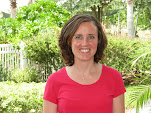Today we were finally able to visit a Puerto Rican school. We went to Abraham Lincoln Public School in Old San Juan. The school is on the coastline and has a beautiful view of the ocean. We met with the principal and several teachers to discuss our school system and their school system. It was very informing and interesting to sit with the teachers and ask questions, compare/contrast schools, and talk about what it is like being a teacher in two different educational systems. I met with a third grade teacher (who spoke limited English) and the primary grade English teacher (she did most of the talking). The main topic of our conversation was centered around Kindergarten (or "Kinder"as they call it) and how this grade is so different between our schools. I got the impression that their Kindergarten is similar to our preschool system, in that there is a stronger focus on social behavior and beginning academics (learning the alphabet and how to write). Whereas, kindergarten in Pennsylvania has a stronger academic focus and children are already coming in knowing the alphabet and how to write their name. Kindergarten is also mandatory in Puerto Rico, whereas children in Pennsylvania are not mandated to attend school until they are eight.
The Abraham Lincoln School is a K-6 building with one class per grade, one self-contained classroom, and one preschool for autistic children. There are children from middle, lower, and upper class with that being divided into two groups: (1) live in the surrounding community and (2) parents work in the community mainly for the government. The children that commute are from the middle and upper class. The other children are from the community called "La Perla" a 29 block long closed community outside the city walls. The community is very poor economically and somewhat like a "ghetto" (for lack of a better word). You would never go into this area without being invited or accompanied by someone who lives there. There is a community leader who is the main person in charge and the community restricts or limits who can live there. We were able to go into La Perla only because we were with the community leader. The land the community is on is prime real estate being right on the coastline and unfortunately the government is trying to take back the land. This is the oldest community in San Juan and it would displace over 1,000 people. It's a very interesting place, to say the least.
The entire educational system in Puerto Rico is currently under revision as new government officials have come into office this past January. One of current changes is that all school districts were dismantled and the superintendents were relocated to schools as principals. This was done primarily because there was a large amount of principal vacancies and this eliminated the need to hire more educators. However, there are more superintendents than there are principal positions. Public schools in Puerto Rico are under No Child Left Behind and are still held accountable to all the same regulations and requirements as we are in the states. The language of instruction has been constantly changing between English and Spanish. Currently, Spanish is the primary language in schools and English is treated as a subject area with students receiving one period of instruction per day from first grade on up. (This is the same as students taking Spanish in the states as a subject area.) Private schools are very popular among middle and upper class families, but there is not much of an academic difference in comparison to public schools. The best schools, however, are the private schools that teach entirely in English. In Puerto Rico there are currently no teacher unions. One was started 8yrs ago but was dismantled 2yrs ago when teachers went on strike, which went against their contract. Teachers are not highly paid (starting salary ~$17,000) and are regarded with relatively high respect, more so in the private schools. It has been very enlightening to explore the Puerto Rican educational system.
After lunch at Rest. El Jibarita (a family owned Puerto Rican restaurant that is a local hangout) we headed back to the university for an afternoon of class. Our Spanish class was wonderful today as we learned about mannerisms, socially acceptable behaviors, and devised a list of ways we can incorporate the Spanish language and culture into our classrooms. After our class we went to dinner at Cafe el Punto as a group. It has been over meals that we have had some of our best discussions and reflections about the trip. Food has a way of making people talk and really discuss. :)
Subscribe to:
Post Comments (Atom)







When we consider our salary and benefits, it makes us appreciate the work PSEa and our locals do for us.
ReplyDeleteReading your post, I thought it was so interesting that they consider kindergarten a time for social development. I taught first grade learning support last year and I felt that these students never had a chance to be 6 year-olds. I can't imagine how rigorous it is in kindergarten in Pennsylvania!
ReplyDelete